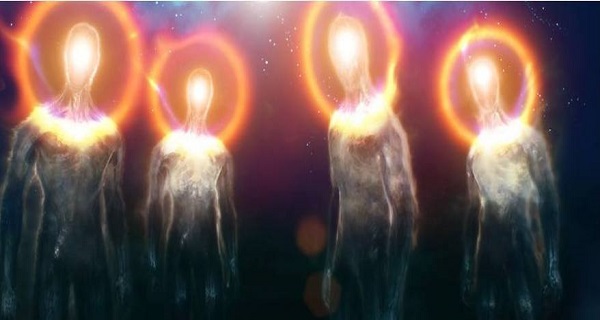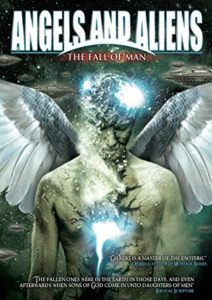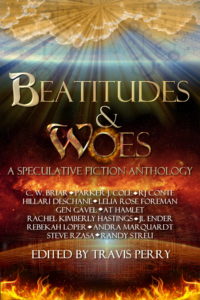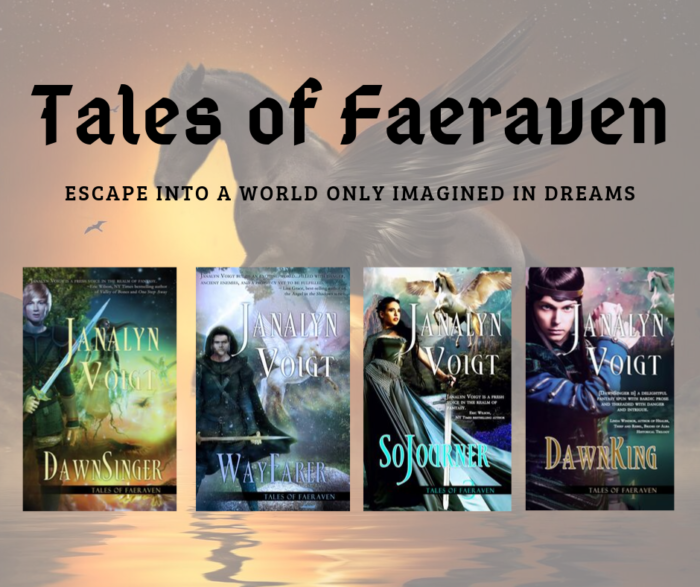Last Tuesday–two days ago–E. Stephen Burnett wrote the post on Speculative Faith entitled Should Christian Storytellers Keep Their Fans From Temptation? The article started out with a strong nod to the idea that it really is a subject of the Bible to talk about causing others to sin or providing temptation for them, referencing specific verses that talk about that very thing. The article also began saying what it had to say it was for Christians and people who wanted to honor God. But it ended by concluding that when the Bible is talking about temptation, it’s only talking about present tense temptation–no hypotheticals–and only talking about people we personally know. People we know about but don’t know personally don’t count. Not only did E. Stephen say it is not only unworkable but also “unbiblical” (his word) to do otherwise, he ended his post implying that caring about tempting others stems from some kind of warped hero complex.
A number of commenters replied positively, both here and on Facebook, as if breathing sighs of relief. If I could summarize that sense of relief in my own words (which almost certainly would be different words than commentators would use for themselves and which may not represent their actual thoughts), it would be something like: “Thank God, we are free from all responsibility except for those rare cases where we happen to know someone in person in the middle of a temptation at a particular moment! But that hardly ever happens, maybe never! Whew! What a relief!”
The reasoning E. Stephen used, as much as it may give a sense of relief, merits a reductio ad absurdum counter, because it falls apart when cross-examined. To give just one possible example [EDIT: I changed the example based on certain comments below], I have never known anyone who admitted to me to being addicted to erotica. Oh, I myself have had problems with pornography/erotica, and I hear enough about this issue to know the problem is common in the Christian world, but nobody has ever confided in me personally that “I have a problem with porn” or “I’m addicted to erotica.” So the standard E. Stephen offered would allow me to write erotica (assuming what I write didn’t have any effect on me), all the while telling myself I’m not tempting anyone, because I mustn’t engage in hypothetical thinking about temptation. Obviously that was not E. Stephen’s intent and I think he tried to account for these kinds of arguments by stating his article was for Christians who desire to honor God. But that would only imply a positive reason for not doing porn–that is, I don’t want to do that because I want to honor Christ. The negative impact on others becomes insignificant, even when I know not everyone will admit issues that they have. So this reductio ad absurdam shows that he has left some very important things out of his approach to this subject. Clearly, his reasoning is incorrect–sadly (sadly because I’m not enjoying disagreeing).
More on what he’s left out is coming up, but let’s circle back to the sense of relief his article produced for some people.
That relief, my friends, is not the fresh air of Christian liberty. Nor is it necessarily pushing towards legalism to say that responsibility goes further than what E. Stephen stated. I realize it may seem like he spoke as a prophet of liberty, but Christian liberty also requires Christian responsibility. Such liberty is rather like owning your own house for the first time–you may feel you can do whatever you want within the confines of your home and you really do have tremendous leeway to paint and redesign and redecorate. But you must also pay the house bills and take care of the place–or you will find yourself living in a mess, with no utilities, or worse. Or to speak more plainly–yes, God gives us tremendous freedom, but he also gives us very real responsibilities. Not virtually non-existent ones.
What E. Stephen called “unworkable” in his post could otherwise be called “hard.” Yes, Christian responsibility is hard–though God by his grace makes it possible and the Holy Spirit enables as well, not only making doing God’s will possible, but actually making it enjoyable to consider consequences and to trust our works into the hands of God.
So note that I am not writing this to take away your Christian liberty–but I’m telling you what liberty really means. It includes responsibility.
Christian responsibility actually does exist beyond particular individuals one happens to know at a particular moment in time. But it’s hard to peg clear rules on how that responsibility should operate. Yet humans are tempted to cut out the need to seek advice of the Creator on what to create, the personal soul-searching and introspection that Christian liberty (believe it or not) demands, and instead substitute a set of rules that make decisions easy. People love clear rules, though some lean towards rules that are demanding, while others lean towards rules that are permissive.
What E. Stephen did in his article, rather than support Christian liberty, was to offer a rule. A permissive rule, yes, but by declaring all other opinions on the topic “unbiblical” I’m afraid E. Stephen has abandoned what Christian liberty actually means and has set himself up as a sort of legalist. I take no pleasure in pointing this out. Nor do I believe he acted this way deliberately or out of ill-will. Still, his categorization of any opinion other than his own as “unbiblical” was troubling and the sense of relief his article generated strikes me as a product of an easy-peasy form of legalism, where all the thinking is already done for you in advance, so you don’t have to concern yourself with thinking about the issue of responsibility yourself.
So, casting aside the simple rule and looking deeper, what might Christian responsibility for artists and creators of stories actually include?
That’s a hard question. Please note the point I want to emphasize is there’s no substitute for seeking God yourself, there is no such thing as simple 1-2-3 answers, that responsibility requires some wrestling with the Lord to find out what His will really is on any particular thing you create. So if you expect me to drop some simple guidelines on you that you can follow easily, without having to think about these matters yourself, without getting into the Scriptures yourself, I’m telling you that’s not simple. That takes time and work to explain. And in fact, the most I can possibly do is point you in the direction of things that might be included in Christian responsibility. It’s between you and your Maker what you will and will not incorporate into your life.
Fortunately, I’ve already done some of this work to explain my positions here on Speculative Faith. I addressed the complex issue of how one should consume culture/art in my article Licking the Chocolate off Poison Pills: A Comment on Cultural Engagement. To summarize that article, I advised against consuming things you know can be temptations for you to sin, that is, a consumer of culture ought to cultivate a sense of being sensitive to personal issues. Sometimes these are very subtle, sometimes they are not. In the category of “not subtle,” I cannot watch shows that feature female nudity (as Game of Thrones does) without having a problem. I am not being a legalist to decide that I cannot watch that show (note I’m only applying any rule to myself)–I’m being sensitive to the will of God, following the Holy Spirit, and obeying the Scripture that references, “bringing every thought into captivity to the obedience of Christ.” (II Corinthians 10:5)
Yes, I happen to agree that readers or consumers of culture are primarily responsible for themselves! But as someone who creates art or stories, the fact that readers or viewers are primarily responsible doesn’t mean I therefore have no responsibility. At the very least, I should avoid creating artwork or stories that has embedded in it things I personally find to be temptations to sin. Because I don’t want to tempt myself to do wrong via what I’m imagining as I create–which is a specific reason why I can’t write erotica–I would be tempting myself, let alone anyone else. So avoiding sinning yourself while creating stories/art might be an aspect of Christian responsibility beyond tempting people you know personally.Â
Among other articles I’ve already written that relate to Christian responsibility versus liberty, way back in 2017 (I think this was one of my first articles for Speculative Faith), I wrote an article specifically about Cosplay–Do the Bible and Conscience Limit Christian Cosplay? The article explains in detail exactly what I mean by Christian liberty, yes in a specific context but broadly as well, that Christian liberty means that I am free in relation to what human beings tell me I should do, but not free to do whatever I want (I Corinthians 7:22 very aptly addresses the dichotomy of being free in Christ but also a slave to Christ). I am free to individually follow convictions God lays on my heart–likewise you are also free in the same way–and we are supposed to accept the fact our convictions may not always be the same. Yet that freedom requires you and I to ask real questions about what is right and what is wrong–what am I representing and am I in agreement with representing that? I concluded the article on cosplay stating for my own self that I would not wear costumes I consider to show too much of my body, ones that represent characters other people look to as heroes that have beliefs I’m completely opposed to and don’t want to represent, and I would not dress as a female character because I think our culture is confused about gender enough and I don’t want to add to the confusion. But then I said those are convictions I draw myself from my study of the Scriptures–what are your convictions? I.e. my expectation is every Christian will do what I do–search the Scriptures for guidance and seek God’s will in every aspect of life. Including concerning every item you create.
Note I am not expecting you to develop the same convictions as me. But I am expecting you to develop convictions for yourself, as I have done, perhaps including about what you want to represent or do not want to represent. Avoiding representing something in a positive way you believe is wrong while creating stories/art might be an aspect of Christian responsibility beyond tempting people you know personally.
Note that there’s one aspect of Christian responsibility that I became aware of from a writer who does not identify as a Christian. Back in the early 90s I read the Tom Clancy novel, The Sum of All Fears. In that novel, Clancy, who delights in including very specific and as correct-as-possible technical details, explains in a note that he deliberately misrepresented how to make an atomic bomb in his story. Because even though all the details on how to make one for real are available online, he did not want to be responsible for specifically instructing people how to do something he felt was horrific. I likewise as a Christian author might choose to forgo explaining exactly how to build a bomb, perform a real-world magical spell, how to obtain illegal drugs, or how to kill someone and get away with it. A story may require such details, but I may (may, perhaps, maybe) not want to include them in a realistic way out of concern for what others might do with the knowledge I have, just as Clancy was concerned. So avoiding teaching someone exactly how to perform an evil act while creating stories/art might be an aspect of Christian responsibility beyond tempting people you know personally.
Am I laying on you the yoke of legalism? Am I offering easy answers that tell you exactly what to do, whether the answers be strict or permissive? No. I am telling you though that being a disciple of Christ requires you to deny yourself and to take up your cross daily and follow him (Matthew 16:24). Is that hard? In your own will it is, but God makes this possible, easy even, through the gift of his Holy Spirit, which provides us the fruits of the Spirit (please reference Galatians 5). You ought to be in prayer about all things (I Thessalonians 5:17)–your responsibility as a sub-creator included. The responsibility to pray about all things you do, including creating stories/art, might (er, wait, no “might” about it) actually is an aspect of Christian responsibility beyond tempting people you know personally.
I addressed a specific issue in fantasy as well, concerning the role of magic in stories. I noted that the Bible creates separate terms for supernatural power that comes from God and power that does not come from God. I laid out seven ways to deal with the problem of magic in stories that called in effect for Christian writers to find solutions to how to apply magic in stories that differs from what the world does with fantasy magic (and I explained in part why I think at least a certain measure of separatism is important in another article). Why would I do that? Well, I see some value in creating separate Christian cultural institutions. I know very well not everyone will agree with me on the need to do that, but for those who do agree with me, having separate cultural institutions in story writing would seem to include having genre expectations for works by Christian authors that would be different from what’s standard in the world. If we are to create distinct genre expectations for works by Christians, the need to create stories/art that match these genre expectations might be an aspect of Christian responsibility beyond tempting people you know personally.
To get to the real crux of my differences with E. Stephen and his article, I wrote an article in which I talked about how fantasy magic can in fact promote modern Paganism (in “What Harm Could Come from Fictional Magic“), which is a reason for me wanting to portray magic differently. And in yet another post I combined a promo for a book I published, Dawn Before the Dark, with a discussion of its magical system being beyond what I would normally publish, but explained I made an exception to the rule because I’m not actually focused on rule-keeping and I’m looking forward to what will happen with future books in that series.
In the article on “What Harm Could Come From Fictional Magic,” I talked about possible future effects. E. Stephen Burnett in his article specifically said that we should not worry about hypotheticals; we should only worry about present issues with people we know personally and that doing otherwise is “unbiblical.” So E. Stephen and I are in direct conflict on this issue–we can’t both be 100% correct (though both of us could be partially right).
First, let’s look at his use of the word “unbiblical”–does E. Stephen have the right to say someone disagreeing with him on a cultural issue is “unbiblical”? Doesn’t the Bible actually say that when sincere believers disagree on cultural issues, such as which holidays to celebrate or not, that each is allowed to have his or her own conviction and each of those convictions matter–that there is no one correct answer in cases like this? Please see Romans 14:5: “One person esteems one day above another; another esteems every day alike. Let each be fully convinced in his own mind.” Note Romans 14 overall is about stronger and weaker believers, but that particular verse is not–the verse references the fact that different believers will have different convictions about things like holidays, and within limits implied by Biblical context, that’s normal and good. We are free to discuss our differences, but we are not free to decide we only are correct and nobody else is. So how can it be “unbiblical” for me to disagree with an interpretation of Scripture on particular things where the Bible allows f0r leeway for personal convictions?
Second, stemming from the point above, it happens to be the case that I really do look at the same Bible passages E. Stephen referenced and see them differently than he did. Did Paul avoid hypotheticals in the discussion of weaker brothers? Did he only refer to people he knew personally? Let’s take a look at I Corinthians 8:9-13 (NKJV) and find out:
“9 But beware lest somehow this liberty of yours become a stumbling block to those who are weak. 10 For if anyone sees you who have knowledge eating in an idolâs temple, will not the conscience of him who is weak be emboldened to eat those things offered to idols? 11 And because of your knowledge shall the weak brother perish, for whom Christ died? 12 But when you thus sin against the brethren, and wound their weak conscience, you sin against Christ. 13 Therefore, if food makes my brother stumble, I will never again eat meat, lest I make my brother stumble.”
Note the Apostle Paul, inspired by the Holy Spirit, says if “anyone sees you.” Anyone. Anyone who has a problem of course, but that’s not a reference to a specific person Paul happened to know, if “anyone” actually means, you know, any possible person. Which is the ordinary meaning of “anyone.”
Note also Paul says “if food makes my brother stumble, I will never again eat meat.” Hmm, that doesn’t sound present tense to me. Yes, it does relate to a specific, known issue, but once Paul became aware of the issue, he expressed a willingness to give up meat forever if need be. “I will never again” is not only a hypothetical–it’s in future tense.
I suppose there must be some way of interpreting this passage so the future tense is really a present tense and the “anyone” is a reference to someone I know. But that’s not the most obvious reading of this passage. In fact, the passage seems to call on us to engage in thought about hypothetical impacts on other people whether we know them or not and to think in future tense, before walking into a Pagan temple (or doing the modern equivalent)–but in fact only concerning known issues. Not concerning hypothetical issues–the passage doesn’t mention hypothetical issues at all.
Note that not mentioning hypothetical issues is not the same as saying “we should never consider hypotheticals” but putting that point aside, it’s clear enough that concerning known issues it doesn’t matter if we know a particular person tempted by that issue or not and that Paul thought in future tense–not just in present. In fact, the responsibility to care about weaker brothers goes beyond the ones you know personally and does include hypothetical impacts on people, at least at certain moments–even if limited to known, specific issues.
So applying what I just said to the reductio ad absurdam argument I used in the edit of this post, I would be able to realize that even if erotica doesn’t cause me to sin personally (which would not be true in real life), even if somehow I thought erotica was beautiful and pure because sex comes from God (not my actual position, but one some people have held), then I might hesitate to write erotica because I know for a fact that lots of Christian people struggle with porn/erotica in way that’s sinful and I don’t want to contribute to their struggles. Even if I don’t know anyone who has admitted to me in person that this is an issue for him or her and even if that person isn’t in the middle of the struggle in the present tense, during the time I’m writing. Thinking ahead a bit and anticipating what is very likely to happen isn’t an unreasonable burden–and I think that’s the kind of reasoning Paul was talking about in I Corinthians 8.
I think the actual crux of E. Stephen’s disagreement with articles I already wrote for Speculative Faith and what he wrote afterwards may stem from the fact he doesn’t actually know any open Neo-Pagans, so for him, the issue is not real. In his mind, there is no known, specific issue in regard to getting people to stumble related to the use of magic in the real world. He’d be like an original reader of the letter to the Corinthians who had no idea that anyone could ever be tempted to sin by him eating meat at the temple of Zeus, because nobody had ever mentioned to him, “Hey, it’s a problem for me if you do that.”
I believe he’s wrong, so I’ve presented a case explaining why I think so. But in the end, E. Stephen answers to God for his conscience, not me. I’ve told him what I know and it’s up to him whether to listen or not.
But note how the case of the weaker brother and the passages E. Stephen focused on are not even actually appropriate. I mean, passages on weaker brothers would be appropriate if we were aware of a serious issue regarding Christians converting from Neo-Paganism and then being tempted to sin by going back to it. But I’m not aware of any such issue–so I don’t concern myself with that at all.
My comments on the harm of fictional magic actually stemmed from concerns about representing a positive view to the world at large that could qualify as a sort of free advertisement or publicity for modern Paganism. It stemmed from concerns about making it easier for people who are not Christians to adopt a non-Christian religion rather than to adopt Christianity. That’s not the same as offering up temptation to sin for a Christian brother or sister.

An artistic representation of both the push into and the pull towards temptation. Image credit: African Broadcasting Network
Does representing something in a positive way in a story affect people’s attitudes towards it? Make them people feel more accepting about it as a general rule? If it doesn’t, then SJWs are wasting their time trying to cast women and other perceived marginalized communities into as many strong roles as possible. And advertisers are wasting their money on paying for placing their products within movies.
Conclusion
I offered five areas of Christian responsibility in creating art or stories that E. Stephen did not address. In fairness, some or all of these he might have addressed at different times and places, other than the post I’m responding to. But note that those five were suggestive–you may not agree with all of them. Or you might in fact, if you study Scripture and seek God, have an approach entirely different from my own to this issue. But there is no such thing as a Christian free from responsibility to the Lord or responsible only for Christian brothers or sisters you happen to know, restricted to the present tense. That’s a dubious reading of the Bible in the first place and responsibility is broader than that in any case. And that’s not me being a jerk and taking away your P-A-R-T-Y. It’s telling the truth and representing the Scriptures as accurately as I’m able.
You are free–free to develop your own convictions and live them. Free to make your own choices–but you should realize the Lord gives guidelines concerning what he does and does not want you to do, through a variety of ways, most importantly his word and the Holy Spirit. If you’re a creator, it’s appropriate to wonder if your works could have negative effects. Not that you let fear paralyze you, but in fact your entire life should be examined before the Lord, every moment bathed in prayer. That may be a lofty goal, but that’s the goal every Christian should be aiming for–not, “I’m free, so I can do what I want.”
Comments on this post from Christians who may or may not agree are of course welcome. What are your thoughts on this topic?



































 Must Christian speculative stories show this ultimate divide between God and His enemy? Is that truly what sets fantasy apart as a genre because it can show the realities of spirituality in ways that other stories can’t? Or is it OK for stories to center on a dragon who is terrorizing the Lake Town or Shelob, the spider who guards the passage into Mordor? Can a story be about a Boromir who wants to accumulate power for himself as a means to do good, but by doing so, becomes the very evil he wants to defeat? Are those stories “evil enough”? Or must there be the over-arching enemy of all that is good that takes center stage in the conflict?
Must Christian speculative stories show this ultimate divide between God and His enemy? Is that truly what sets fantasy apart as a genre because it can show the realities of spirituality in ways that other stories can’t? Or is it OK for stories to center on a dragon who is terrorizing the Lake Town or Shelob, the spider who guards the passage into Mordor? Can a story be about a Boromir who wants to accumulate power for himself as a means to do good, but by doing so, becomes the very evil he wants to defeat? Are those stories “evil enough”? Or must there be the over-arching enemy of all that is good that takes center stage in the conflict? I wonder which would be the scariest on Halloween: a dragon, a witch, a spider, an orc, Golum, a black rider, or a searching eye. Which, if it were real, would be the biggest threat? My guess is, the greatest wickedness would be the one we least fear. It’s familiar, comfortable even, without the dangerous elements we usually associate with evil.
I wonder which would be the scariest on Halloween: a dragon, a witch, a spider, an orc, Golum, a black rider, or a searching eye. Which, if it were real, would be the biggest threat? My guess is, the greatest wickedness would be the one we least fear. It’s familiar, comfortable even, without the dangerous elements we usually associate with evil.
 The plot of It: Chapter Two is driven by Mike Hanlonâs secretive plan to destroy Pennywise. Mike believes that Pennywise is just a physical manifestation of an extra-dimensional evil force that fell from the sky hundreds of years agoâinformation he found out from a Native American tribe during his research on the history of Derry. In a drug-induced vision scene, Mike and Bill witness the âDeadlightsâ fall comet-like from the sky and strike the earth.
The plot of It: Chapter Two is driven by Mike Hanlonâs secretive plan to destroy Pennywise. Mike believes that Pennywise is just a physical manifestation of an extra-dimensional evil force that fell from the sky hundreds of years agoâinformation he found out from a Native American tribe during his research on the history of Derry. In a drug-induced vision scene, Mike and Bill witness the âDeadlightsâ fall comet-like from the sky and strike the earth.


 Sponsored Reviews
Sponsored Reviews The Treasure of Capric, Brandon M. Wilborn
The Treasure of Capric, Brandon M. Wilborn How Geeks Can Get Excited About God
How Geeks Can Get Excited About God
 Apparently that wasn’t the whole story. “Most educated Europeans and mariners already knew that [the earth was round]” (
Apparently that wasn’t the whole story. “Most educated Europeans and mariners already knew that [the earth was round]” ( Fast forward 50 years and beyond from the creation of Columbus Day as a holiday, and the flawed explorer has been so discredited that a movement began to spread to change the holiday from Columbus Day to Indigenous People’s Day. So instead of celebrating the courage and ingenuity of an explorer who brought the world closer together—albeit, with unexpected and tragic results, in many ways—we are celebrating people who were unaware of the world at large, because, apparently, being unaware made them heroes.
Fast forward 50 years and beyond from the creation of Columbus Day as a holiday, and the flawed explorer has been so discredited that a movement began to spread to change the holiday from Columbus Day to Indigenous People’s Day. So instead of celebrating the courage and ingenuity of an explorer who brought the world closer together—albeit, with unexpected and tragic results, in many ways—we are celebrating people who were unaware of the world at large, because, apparently, being unaware made them heroes.
 Seated at a scarred table in the innâs common room, Rand did his best to ignore the hostile stares from more than one pair of rounded eyes. Heâd chosen a dark corner away from the lanthorn light in the hope of escaping notice. As a Kindren among the Elder, heâd expected to encounter suspicion. From the look of this crowd, heâd better keep watch to avoid being knifed in his bed. He couldnât let anything happen to him, not with his fatherâs errand to carry out, although the thought of it made his stomach churn.
Seated at a scarred table in the innâs common room, Rand did his best to ignore the hostile stares from more than one pair of rounded eyes. Heâd chosen a dark corner away from the lanthorn light in the hope of escaping notice. As a Kindren among the Elder, heâd expected to encounter suspicion. From the look of this crowd, heâd better keep watch to avoid being knifed in his bed. He couldnât let anything happen to him, not with his fatherâs errand to carry out, although the thought of it made his stomach churn. Janalyn Voigt is a multi-genre novelist who has books available in the western historical romance and epic fantasy genres. Her unique blend of adventure, romance, suspense, and whimsy creates worlds of beauty and danger for readers. An inspirational, motivational, and practical speaker, Janalyn has presented at the Northwest Christian Writersâ Renewal Conference and Inland Northwest Christian Writers Conference. She has also spoken for local writing groups, book events, and libraries. Janalyn is represented by Wordserve Literary and holds memberships in American Christian Fiction Writers and Northwest Christian Writers Association.
Janalyn Voigt is a multi-genre novelist who has books available in the western historical romance and epic fantasy genres. Her unique blend of adventure, romance, suspense, and whimsy creates worlds of beauty and danger for readers. An inspirational, motivational, and practical speaker, Janalyn has presented at the Northwest Christian Writersâ Renewal Conference and Inland Northwest Christian Writers Conference. She has also spoken for local writing groups, book events, and libraries. Janalyn is represented by Wordserve Literary and holds memberships in American Christian Fiction Writers and Northwest Christian Writers Association.



 You all, I am sure, have some awful, unforgettable piece of art to nominate for the title. And you would all be wrong, for none of you has seen Finianâs Rainbow.
You all, I am sure, have some awful, unforgettable piece of art to nominate for the title. And you would all be wrong, for none of you has seen Finianâs Rainbow.
 Example 2: You invite me to see Joker with you. Despite my
Example 2: You invite me to see Joker with you. Despite my 




